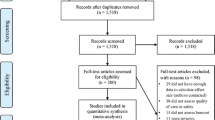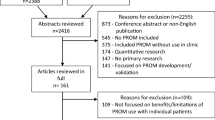Abstract
Background
Because physician practices contribute to national healthcare expenditures, initiatives aimed at educating physicians about high-value cost-conscious care (HVCCC) are important. Prior studies suggest that the training environment influences physician attitudes and behaviors towards HVCCC.
Objective
To explore the relationship between medical student experiences and HVCCC attitudes.
Design
Quantitative and qualitative analysis of a multi-institutional survey.
Participants
Medical students from nine US medical schools.
Approach
A 44-item survey that included the Maastricht HVCCC Attitudes Questionnaire, a validated tool for assessing HVCCC attitudes, was administered electronically. Attitudinal domains of high-value care (HVC), cost incorporation (CI), and perceived drawbacks (PD) were compared using one-way ANOVA among students with a range of exposures. Open text responses inviting participants to reflect on their attitudes were analyzed using classical content analysis.
Key Results
A total of 740 students completed the survey (response rate 15%). Students pursuing a “continuity-oriented” specialty held more favorable attitudes towards HVCCC than those pursuing “technique-oriented” specialties (HVC sub-score = 3.20 vs. 3.06; p = 0.005, CI sub-score = 2.83 vs. 2.74; p < 0.001). Qualitative analyses revealed personal, educational, and professional experiences shape students’ HVCCC attitudes, with similar experiences interpreted differently leading to both more and less favorable attitudes.
Conclusion
Students pursuing specialties with longitudinal patient contact may be more enthusiastic about practicing high-value care. Life experiences before and during medical school shape these attitudes, and complex interactions between these forces drive student perceptions of HVCCC.
Similar content being viewed by others
References
Galvani AP, Parpia AS, Foster EM, Singer BH, Fitzpatrick MC. Improving the prognosis of health care in the USA. Lancet. 2020;395(10223):524-33.
Haslam A, Crain T, Gill J, Herrera-Perez D, Prasad V. Where does the blame for high health care costs go? An empirical analysis of newspaper and journal articles criticizing health care costs. Am J Med. 2019;132(6):718-21.
Leep Hunderfund AN, Dyrbye LN, Starr SR, Mandrekar J, Tilburt JC, George P, et al. Attitudes toward cost-conscious care among U.S. physicians and medical students: analysis of national cross-sectional survey data by age and stage of training. BMC Med Educ. 2018;18(1):275.
Owens DK, Qaseem A, Chou R, Shekelle P. High-value, cost-conscious health care: concepts for clinicians to evaluate the benefits, harms, and costs of medical interventions. Ann Intern Med. 2011;154(3):174-80.
Foundation ABoIM. American Board of Internal Medicine Foundation 2023. Available from: https://abimfoundation.org/. Accessed 30 April 2024.
Foundation ABoIM. Choosing Wisely. Available from: https://www.choosingwisely.org/. Accessed 30 April 2024.
Weinberger SE. Providing high-value, cost-conscious care: a critical seventh general competency for physicians. Ann Intern Med. 2011;155(6):386-8.
Born KB, Moriates C, Valencia V, Kerssens M, Wong BM. Learners as leaders: a global groundswell of students leading Choosing Wisely initiatives in medical education. Acad Med. 2019;94(11):1699-703.
Antiel RM, James KM, Egginton JS, Sheeler RD, Liebow M, Goold SD, et al. Specialty, political affiliation, and perceived social responsibility are associated with U.S. physician reactions to health care reform legislation. J Gen Intern Med. 2014;29(2):399-403.
Dugger RA, El-Sayed AM, Messina C, Bronson R, Galea S. The health policy attitudes of American medical students: a pilot survey. PLoS One. 2015;10(10):e0140656.
Resnicow K, Patel MR, McLeod MC, Katz SJ, Jagsi R. Physician attitudes about cost consciousness for breast cancer treatment: differences by cancer sub-specialty. Breast Cancer Res Treat. 2019;173(1):31-6.
Ryskina KL, Halpern SD, Minyanou NS, Goold SD, Tilburt JC. The role of training environment care intensity in US physician cost consciousness. Mayo Clin Proc. 2015;90(3):313-20.
Leep Hunderfund AN, Starr SR, Dyrbye LN, Baxley EG, Gonzalo JD, Miller BM, et al. Imprinting on clinical rotations: multisite survey of high- and low-value medical student behaviors and relationship with healthcare intensity. J Gen Intern Med. 2019;34(7):1131-8.
Ryskina KL, Smith CD, Arora VM, Zaas AK, Halvorsen AJ, Weissman A, et al. Relationship between institutional investment in high-value care (HVC) performance improvement and internal medicine residents’ perceptions of HVC training. Acad Med. 2018;93(10):1517-23.
Danis M, Sommers R, Logan J, Weidmer B, Chen S, Goold S, et al. Exploring public attitudes towards approaches to discussing costs in the clinical encounter. J Gen Intern Med. 2014;29(1):223-9.
Mordang SBR, Konings KD, Leep Hunderfund AN, Paulus ATG, Smeenk F, Stassen LPS. A new instrument to measure high value, cost-conscious care attitudes among healthcare stakeholders: development of the MHAQ. BMC Health Serv Res. 2020;20(1):156.
Meisenberg BR, Varner A, Ellis E, Ebner S, Moxley J, Siegrist E, et al. Patient attitudes regarding the cost of illness in cancer care. Oncologist. 2015;20(10):1199-204.
Chino F, Peppercorn J, Taylor DH Jr, Lu Y, Samsa G, Abernethy AP, et al. Self-reported financial burden and satisfaction with care among patients with cancer. Oncologist. 2014;19(4):414-20.
Agrawal JR, Huebner J, Hedgecock J, Sehgal AR, Jung P, Simon SR. Medical students’ knowledge of the U.S. health care system and their preferences for curricular change: a national survey. Acad Med. 2005;80(5):484-8.
Huebner J, Agrawal JR, Sehgal AR, Jung P, Hedgecock J, Simon SR. Universal health care and reform of the health care system: views of medical students in the United States. Acad Med. 2006;81(8):721-7.
Dyrbye LN, West CP, Hunderfund AL, Sinsky CA, Trockel M, Tutty M, et al. Relationship between burnout, professional behaviors, and cost-conscious attitudes among US physicians. J Gen Intern Med. 2020 May; 35(5):1465-76
Brateanu A, Schramm S, Hu B, Boyer K, Nottingham K, Taksler GB, et al. Quantifying the defensive medicine contribution to primary care costs. J Med Econ. 2014;17(11):810-6.
Beatty PC, Willis GB. Research synthesis: the practice of cognitive interviewing. Public Opin Q. 2007;71(2):287-311.
Jones MD Jr, Yamashita T, Ross RG, Gong J. Positive predictive value of medical student specialty choices. BMC Med Educ. 2018;18(1):33.
Manuel RS, Borges NJ, Jones BJ. Person-oriented versus technique-oriented specialties: early preferences and eventual choice. Med Educ Online. 2009;14:4.
Bauer MW. Classical content analysis: a review. In: Bauer MW, Gaskell G, eds. Qualitative researching with text, image and sound: a practical handbook. Sage Publications. 2000:131-51.
Colleges AoAM. FACTS 2023 [Applicants, Matriculants, Enrollment, Graduates, MD-PhD, and Residency Applicants Data]. Available from: https://www.aamc.org/data-reports/students-residents/data/2023-facts-applicants-and-matriculants-data. Accessed 30 April 2024.
Leep Hunderfund AN, Dyrbye LN, Starr SR, Mandrekar J, Naessens JM, Tilburt JC, et al. Role modeling and regional health care intensity: U.S. medical student attitudes toward and experiences with cost-conscious care. Acad Med. 2017;92(5):694-702.
Mordang SBR, Leep Hunderfund AN, Smeenk F, Stassen LPS, Konings KD. High-value, cost-conscious care attitudes in the graduate medical education learning environment: various stakeholder attitudes that residents misjudge. J Gen Intern Med. 2021;36(3):691-8.
Mezirow J. Transformative learning: theory to practice. New Dir Adult Contin Educ. 1997;1997(74):5-12.
Erath A, Mitchell M, Salwi S, Liu Y, Sherry A. The sooner the better: high-value care education in medical school. Acad Med. 2019;94(11):1643-5.
Acknowledgements
The authors wish to thank Serge Mordang (Maastricht University, Netherlands) for permission to use the MHAQ, Andrea Leep Hunderfund (Mayo Clinic, Rochester MN) for advice on survey distribution, and the STARS (Students and Trainees Advocating for Resource Stewardship) Program and STARS Research Consortium for their support of this work.
Funding
The Family Medicine program at OHSU provided $500 in funding.
Author information
Authors and Affiliations
Contributions
Criteria for authorship: Hunter Niehus: conceptualization, formal analysis, investigation, methodology, project administration, validation, writing—original draft, writing—review and editing. Ali Gunesch: conceptualization, formal analysis, investigation, methodology, project administration, validation, writing—original draft, writing—review and editing. Nina Rodriguez: investigation, writing—original draft, writing—review and editing. Julianna Khoury: investigation, writing—original draft, writing—review and editing. Annie Ma: investigation, writing—original draft, writing—review and editing. Nina Gu: investigation, writing—original draft, writing—review and editing. Thy Cao: investigation, writing—original draft, writing—review and editing. Megan Muller: investigation, writing—original draft, writing—review and editing. Christopher Moriates: conceptualization, investigation, writing—original draft, writing—review and editing. Anne Linker: investigation, writing—original draft, writing—review and editing. Micah Prochaska: investigation, writing—original draft, writing—review and editing. David Fish: investigation, writing—original draft, writing—review and editing. Glenn Moulder: investigation, writing—original draft, writing—review and editing. Melissa Stephens: investigation, writing—original draft, writing—review and editing. Patricia A. Carney: conceptualization, data curation, formal analysis, funding acquisition, investigation, methodology, project administration, resources, supervision, validation, visualization, writing—original draft, writing—review and editing. Andrea Smeraglio: conceptualization, data curation, formal analysis, funding acquisition, investigation, methodology, project administration, resources, supervision, validation, writing—original draft, writing—review and editing.
Corresponding author
Ethics declarations
Conflict of Interest:
Dr. Moriates is the Executive Director for the national non-profit organization Costs of Care and the founder of the STARS program in the United States. Drs. Moriates, Smeraglio, and Prochaska have a grant through The Arnold Foundation to study education around High Value Cost Conscious Care.
Additional information
Publisher's Note
Springer Nature remains neutral with regard to jurisdictional claims in published maps and institutional affiliations.
Supplementary Information
Below is the link to the electronic supplementary material.
Supplemental File A
(DOCX 29.4 KB)
Rights and permissions
About this article
Cite this article
Niehus, H., Gunesch, A.N., Rodriguez, N. et al. Factors Associated with Medical Students’ Attitudes About Cost-Conscious Care: A Mixed-Methods Multi-school Study. J GEN INTERN MED (2024). https://doi.org/10.1007/s11606-024-08783-x
Received:
Accepted:
Published:
DOI: https://doi.org/10.1007/s11606-024-08783-x




